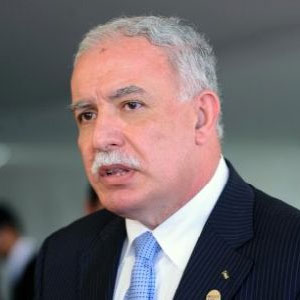Less than a year ago, the Palestinian leadership was at the United Nations in New York, claiming a triumph in winning observer-state status, over the objections of Israel, the United States, and Canada. Now, they have backed off that campaign, taken on secretive peace talks with Israel that they view with deep skepticism, and quiet diplomacy is the order of the day, the Globe and Mail reported.
Riyad al-Maliki, the Palestinian Authority's Foreign Minister, visiting Ottawa to open a rapprochement with the Harper government before he heads to this year's UN General Assembly, admits that after last year's defiant tone - and landslide vote - it's harder to bring a clear Palestinian message to the United Nations now. There are peace talks, but he doesn't have much confidence they will lead to a breakthrough.
After last year's vote, Palestinian President Mahmoud Abbas returned to the West Bank to cheering crowds, portraying the change in UN status as a major victory, as Israel worried that the UN vote would be followed by a campaign to gain state status at other bodies like the International Criminal Court. But Mr. al-Maliki said they paused to count the cost.
Winning membership in UNESCO, the UN educational agency, a year before in 2011, had led the United States to cut its funding by $60-million (U.S.), hurting projects for the very nations that backed Palestinian membership, he said.
"This really put us in an awkward position," he said in an interview Friday with The Globe and Mail at the Palestinian Authority's delegation office in Ottawa. "You know, it could be very easy, that we take a decision, we say let us move immediately and apply to all the agencies. This is really easy. But is it responsible? Not necessarily."
Mr. al-Maliki continued: "And while we were in this situation, we were offered the possibility of going back to the negotiations [with Israel]. And in that regard, we were offered something else, which we considered to be of great interest. The offer was that if we refrain from going to these organizations or applying for membership, that Israel would be ready to release 104 Palestinian political prisoners, who were in prison before [the 1993 Oslo peace accord]."
Mr. Abbas felt he had to take that deal, Mr. al-Maliki said. But the Palestinian Foreign Minister said he sees little hope for the peace talks. He argues that Israel's day-to-day behaviour shows it does not really want to negotiate a two-state solution, citing recent arrest raids in Palestinian refugee camps and approval of new East Jerusalem settlement homes, among other things. That indicates the Israelis want to weaken Mr. Abbas's capacity to negotiate, and prefer the status quo, he said.
"Frankly speaking, as long as this kind of unbalanced situation exists, I don't see any possibility for things to move forward," he said. "When you see Palestine as a state under occupation and Israel as the occupying power, who are dictating terms, who are doing things on the ground to weaken the ability of the Palestinian President, especially in the eyes of his own people."
He added: "But at the end of the day, what are your options? Your options are very much limited.
"And when the international community, represented by the U.S. administration tells you, 'Look, we want to see if it's possible to resume talks that will lead ultimately to ending the Israeli occupation and to allow the establishment of an independent Palestinian state according to 1967 borders, you say, 'Okay, let's see if that's really possible, or not.'"
Mr. al-Maliki also expressed skepticism that the "international community" can really apply pressure to broker a deal. At the moment, much of that attention is directed toward nearby Syria, where a civil war has claimed more than 100,000 lives, and where a diplomatic deal over chemical-weapons decommissioning has forestalled threats of a U.S. attack.
But he insists he's not worried that the conflict in Syria will take international attention away from Israeli-Palestinian peace talks. There's no sign, he said, that the world - and the United States - has turned its attention away from the peace process. And, he added: "What's happening in Syria requires the attention of the international community, including us."
Mr. al-Maliki said he and Canadian Foreign Affairs Minister John Baird found some common ground on Syria: Both are in favour of a negotiated peace there, and deeply wary of foreign jihadists entering the country and of foreign funding for competing militias, he said. They discussed ways of "empowering" the "democratic elements" in Syria's opposition. "When they tell us that citizens from 60 to 80 countries are fighting in Syria, then you really question, 'Is this really an internal Syrian conflict, or is it the world's?' A proxy war, by so many parties," he said.
In Ottawa, meanwhile, Mr. al-Maliki has marked a change in tone in relations between the Palestinian Authority and the Harper government. There were warm words from both sides - after bitter rhetoric last year over the Palestinian bid for observer-state status at the UN. Mr. al-Maliki said he hasn't seen a dramatic shift in the Harper government's staunch pro-Israel stance on Mideast issues, but he has sensed the potential for a shift toward better relations with Palestinians.
"There is a potential. And maybe also an intention," he said."Not necessarily sense that they will be less pro-Israel. But in the sense they could also open up to be in favour of Palestine. There's no contradiction between one and the other, at least at certain points."






